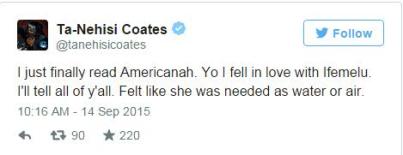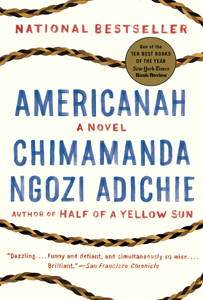I don’t read books that often, but I want to respond with my visceral reactions to them as soon as possible. (Not a review, a reaction.) So first up – Americanah.
Americanah, by Chimamanda Ngozi Adichie, is a beautiful piece. I finally got around to reading it after seeing it displayed in a book store as a “Good Reads” (which is a vast understatement. You say good, I say f**king awesome) a few years ago. It chronicles the coming-of-age and adult life of Ifemelu, a woman from Nigeria who inadvertently leaves behind a man she loves for an education in America. Her interactions and experiences with being an immigrant, love and the loss of loves, and acknowledging blackness, hers and of those around her, as framed by America’s poor history of race relations (or lack of relations, can I just say) and her own purely African identity.
Personally, I think what gave me the most value from the book was that Chimamanda constructed it so effortlessly and subtly as a work detailing the intersectionalities of race, gender, and immigration. And love. I especially when Chimamanda details out how insidious racism can be: it’s in the little comments like “well, that’s not what [insert ignorant person] really meant. I think you’re overthinking this”*. As an Indian-American woman with immigrant parents (does calling myself a woman imply adulthood? Sweet baby Jesus.) who sometimes struggles with similar concepts, it was like this sisterhood. (I mean, I’m sure many others have written something similar, over and over again.) Chimamanda actually explores this concept in her TEDtalk “The Danger of a Single Story”, which is material that makes her book even more poignant for me. Ifemelu’s life is not every Nigerian’s story, nor is it every immigrant’s story, nor is it every black person’s story, nor every woman’s story. And I think the West must be careful to not take it as the bible of the modern African or of modern Africa, as it has the tendency to do so with other material (A la ‘Slumdog Millionaire’ and ‘The Namesake’, even – not every South Asian/-American is “suffering” from culture crisis or poverty, guys). Yet, at the same time – it is many people’s story, in the sense that we have all picked up this book and felt, “Omg that is so me”. This duality is so important to me: being of the audience and still apart from them.
BUT. Ifemelu, as a character, made me so upset with her. Like she was my friend and I wanted to look out for her, but also because I really did see a lot of myself in her (it’s probably because Ifemelu is noted as never holding back with her words – essentially a loudmouth – I’m working on it, ok?). A few weeks ago, journalist and certified genius (like he got an award for it, you know) Ta-Nehisi Coates tweeted this:
But initially, I didn’t fall in love with Ifemelu. (Ta-Nehisi – you rock, and I respect your opinion as I religiously follow your Twitter feed, and your book is totes next on my list after Aziz Ansari’s Modern Romance – but this is how I feel) Ta-Nehisi Coates and perhaps other men who have read “Americanah” fell in love with Ifemelu because they knew her thoughts. They knew her progression as a character and as a person. But did they know her in real life?
[Spoiler, sorry] Ifemelu hurts the men she claims to love, basically ghosts Obinze out of unembodied shame (which I can’t blame her for), has many obstacles that other people have to face cleared for her, and gets to fund her lifestyle with a well-crafted blog. And THEN: almost expects Obinze to uproot his life as she callously lands down again in Nigeria fifteen years later. Her life seemed almost… easy. (Thinking back on this, as of a couple days later, after flipping through the book again: her life is anything but easy. She has to start over in a new country, had absolutely no money to spend for rent or food, let alone to send home, couldn’t find a job and fell into a deep depression, during which she couldn’t talk to Obinze fell apart. She struggled immensely even later on, as a cousin and member of her family in America, and I initially overlooked her pain while I focused on where her story took her. [This is why you have the book handy while writing something about it. Duh.] Shows how far I have to go in realizing class and race privilege as well.)
And then I realized, I feel like this about Ifemelu because there is the inkling of the belief – no matter how much I try to push back against it – that she can’t have it all. She can’t have the cool race blogger career, and get an easy greencard that her hot white ex-boyfriend sets her up with, and get to reunite with her soulmate. Even more, I felt a startling emotion– one that is more intruding for me than I’d like to admit – envy. Ifemelu is so unapologetic about her actions and words and decisions (especially when it comes to relationships and love). She does not do what she thinks is best or right, but rather almost has the capability to not worry about what the best or right is. Maybe it felt to me as a privilege not afforded to most women of color in America or throughout the world, to not constantly think of the consequences of speaking, walking, living – “if I say or do this, who’s going to get on my bad side?” She just says it (like when she calls out her boss’s sister on implicit racist comments who gets angry later), try as she might (and she does many times) to hold back. And the fact that we could get inside Ifemelu’s head throughout the novel, without her blatant self-regulation of action – leads to me to assume the absence of that self-regulation.
I know: my judgement of Ifemelu (and by extension, Chimamanda – I read that she included many of her own essays before publishing the books; Ifemelu, for a large part, is based on her own life journey) makes me patronizing and probably pretty stupid. But at the same time, I also feel this awareness: my judgement also shows me that I have a long way to go in tearing down these biases stored inside me even about women that I admire, that I see as steadfast and unapologetic and who I aspire to be someday. Ifemelu does not owe anyone gratitude or affection and her success is her own. Maybe, one day, I too can have it all? (Question mark because I don’t know yet.) So Ta-Nehisi is right: someone like Ifemelu is “as needed as water or air” to me as well.
But this is where I know that, despite my pettiness about Ifemelu, Chimamanda has my back. This is from another TEDtalk (one made famous by my girl, Beyonce), called “We Should All be Feminists”:
…We teach girls to shrink themselves, to make themselves smaller. We say to girls, “You can have ambition, but not too much. You should aim to be successful, but not too successful, otherwise you would threaten the man…
…the reality is more difficult and more complex. We are all social beings. We internalize ideas from our socialization….
…I’m trying to unlearn many of the lessons of gender that I internalized when I was growing up. But I sometimes still feel very vulnerable in the face of gender expectations….
…I have chosen to no longer be apologetic for my femaleness and my femininity. And I want to be respected in all of my femaleness because I deserve to be.
(Obviously I picked the parts that I wanted to include. The full talk is excellent and on point.)
And I think that’s what makes Chimamanda, and this book, so brilliant. Americanah has increased my familiar awe of Chimamanda (because I’ve always admired and respected her – from her other writing). She painted this character who I didn’t actually warm up to until a bit into the book, even as I saw myself in her. Someone who doesn’t make herself small, who you root for but also silently reprimand. Someone who is navigating and observing the world as we navigate and observe her (and ourselves, let’s remember). Someone who treats love as attainable and deserved. Someone who, essentially, at her core, is a character, yet a representation of so many women.
(Besides, I have to thank Ifemelu. Secret: She’s a large part of why I started this blog.)


Dude, I loved your analysis of this book!!! It resonated so much with me and made me miss you so much. Soon to be reunited with my soul sister.
LikeLike